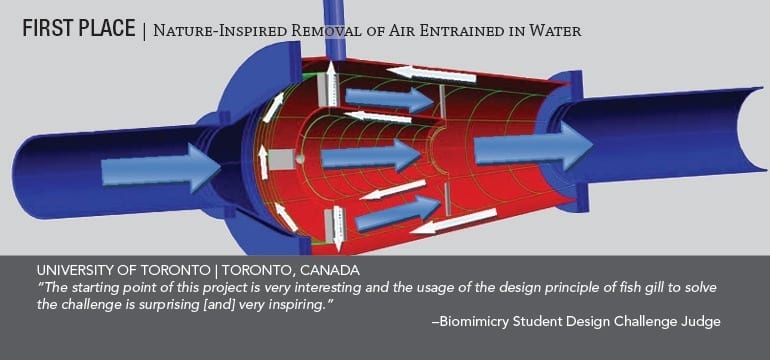
Finalists announced for the world’s first food system focused biomimicry innovation accelerator
Earlier this year, hundreds of people from around the world took on a challenge to fix our global food system by looking to nature for design solutions. Now, eight finalist teams have been invited to prototype their solutions in an accelerator program that will award $100,000 to the top contender in an effort to increase speed to market for biomimetic solutions to global problems.
The Biomimicry Institute’s Biomimicry Global Design Challenge, sponsored by the Ray C. Anderson Foundation, asks participants to tackle any aspect of the food system that could be improved by looking to nature for design guidance. In the first year of this Challenge, the focus is on key food and agriculture issues like waste, packaging, agricultural pest management, food distribution, energy use, and other solutions.
Biomimicry Institute engaged 60 judges, themselves biologists, business leaders, venture capitalists, and agriculture, to select eight finalist teams. These teams have designed a range of solutions using biomimicry, such as desalination by looking to mangrove forests, soil remediation by emulating the digestive tract of earthworms, and a peertopeer networking app whose algorithm mimics the communication function found in a flock of birds. A full list of the finalists’ submissions and links to their pitch videos can be found here.
“Entrepreneurs don’t have the same R&D budgets as big companies, but those who are patient enough to understand and employ nature’s designs have a distinct advantage: they are leveraging millions of years of evolution,” said Beth Rattner, Biomimicry Institute executive director. “That’s what we’re seeing with these amazing submissions. They aren’t just good ideas? they’re proof points that radically sustainable products are possible.”
The finalist teams will travel to Austin, TX on October 4, 2015, to present their ideas at SXSW Eco, pitch to judges on the marketability of their ideas, and participate in an awards event. The teams will then spend the next eight months prototyping and testing their innovations, and will compete for the $100,000 Ray C. Anderson “Ray of Hope” Prize, to be awarded in 2016.
“Seeding and accelerating nature inspired solutions to global challenges and then mentoring them as they seek marketability is an idea that my grandfather would say is ‘so right and so smart’,” said John Lanier, executive director of the Ray C. Anderson Foundation. Interface Founder Ray Anderson, who funded the Foundation upon his passing in 2011, was famously inspired by radical new approaches to centuries old design and manufacturing techniques, and sought them out when rethinking his $1 billion, global carpet tile company’s products and processes.
The Ray C. Anderson Foundation has pledged $1.5 million over four years to support the Biomimicry Global Design Challenge, a multiyear effort to crowdsource, support, and seed promising innovations inspired by nature. Each year beginning in 2016, the Institute and Foundation together will award the $100,000 “Ray of Hope” Prize to the most viable prototype that embodies the radical sustainability principles of biomimicry. The first two years are focused on food systems, while subsequent years will change to other sustainability issues.
A new round of the Biomimicry Global Design Challenge opens October 5, which will be another opportunity for teams to join and compete for the $100,000 “Ray of Hope” Prize.
Individuals and teams can learn more about the first round finalists and register for the next round at challenge.biomimicry.org.
The Latest on: Biomimicry Global Design Challenge
[google_news title=”” keyword=”Biomimicry Global Design Challenge” num_posts=”10″ blurb_length=”0″ show_thumb=”left”]
via Google News
The Latest on: Biomimicry Global Design Challenge
- How global innovators design a sustainable futureon April 22, 2024 at 8:52 am
Projects are sprouting up around the globe to build environmentally focused communities. These efforts aim to be practical and inviting, not idealistic.
- DESIGN CHALLENGEon March 31, 2024 at 5:00 pm
The Design Challenge gives students from universities and university technical colleges (UTCs) a taste of ‘real world’ engineering, challenging them to design, create, present and run a device to a ...
- Shein Unveils Winner of Global Challenge 2024, a Competition for Young Designerson March 21, 2024 at 3:34 pm
PICKING A WINNER: Italian designer Eleonora Falcone has won the Shein X Global Challenge 2024 ... original concept into design, while balancing customer demands, seasonal trends and commercial ...
- Design Challengeon October 13, 2023 at 1:49 am
Ansys is the global leader in engineering simulation software ... software is available to student teams through our partnership for free. Tackle a range of design challenges, including motor design, ...
- Megan Schuknechton April 22, 2020 at 2:19 pm
A biologist by training, Megan Schuknecht combines her passions for nature, education and entrepreneurship in running the Biomimicry Institute's annual Global Design Challenge and Launchpad ...
- Global Website Design Standardson November 10, 2019 at 7:03 am
All Drexel University websites which are not considered part of the "core" drexel.edu site must use the following global elements which cannot be modified (with exceptions noted): In addition to ...
- Biomimicry Instituteon July 2, 2019 at 3:30 pm
Janine Benyus 4 years ago - The tagline for this year’s Biomimicry Global Design Challenge, “Design° for People + Planet,” asks participants to look at what degree of change they will make for a ...
- Global Engineering Challengeon September 27, 2017 at 7:47 am
The engineering challenges of the 21st century require skills in problem-solving, design, teamwork, communication and global awareness, as well as technical knowledge. The Sheffield University Global ...
- 2015 Hackaday Prizeon December 6, 2015 at 4:00 pm
Radu Motisan has been building a global environmental surveillance network which first monitored radiation levels, and since has added the ability to measure air quality. He believes that people ...
- food systemon November 25, 2015 at 4:00 pm
But you’ve got to think like Mother Nature for the 2016 Biomimicry Global Design Challenge. The aim of this challenge is to transform the global food system using sustainable approaches that ...
via Bing News









